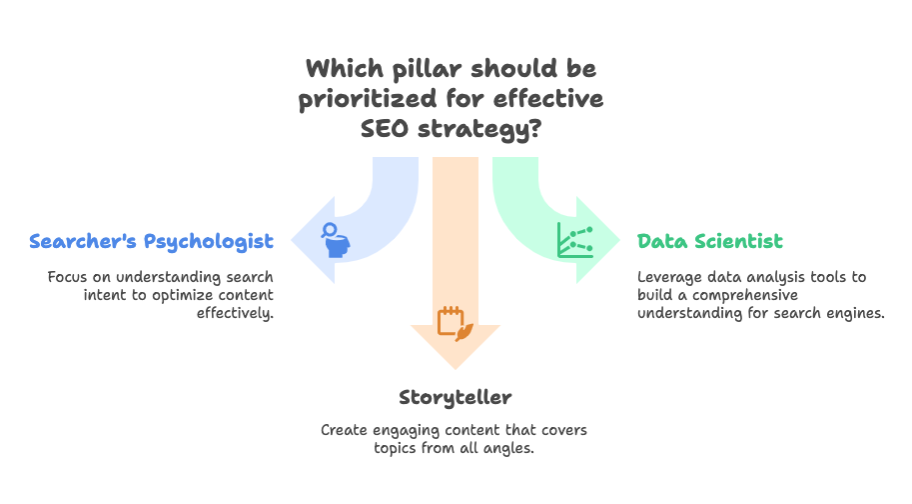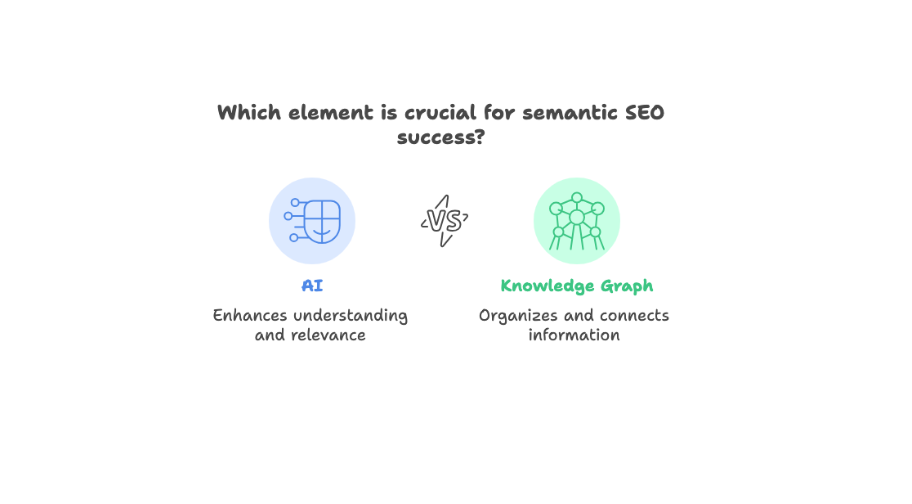Introduction Semantic SEO
Let’s take a moment to be absolutely honest. SEO with a lot of keywords is outdated. Google’s algorithm changes are the headshot waiting to happen, and the digital world is like a zombie shambling through it.
The signs are obvious: you diligently optimise for a term, rank #1, and then the traffic is pitiful. There are no conversions at all. Why? Due to the fact that Google is no longer only a keyword machine It’s evolved into a sophisticated understanding engine. It doesn’t just look for words; it hunts for meaning, context, and intent.
The Semantic SEO Expert is now the most valuable actor in the field of digital marketing as a result of this profound change. This isn’t just another SEO campaign using a brand-new term. Combining the skills of a strategist, technologist, and psychologist, this expert not only deceives the algorithm but also instructs it.
This comprehensive handbook is your masterclass, with 7,000 words. We’ll tear down the outdated strategy and provide you the cutting-edge, doable tactics you need to become a true Semantic SEO Expert, secure your website for the future, and achieve unheard-of organic growth.
The practice of producing material for subjects rather than just keywords is known as semantic SEO. Its main goals are to comprehend search intent and deliver thorough, excellent content that meets the expectations of the user.
This strategy takes into account word relationships and context to raise search engine results and provide users with more insightful material.
A person who optimises digital content to match Google’s advanced understanding of user intent, contextual relationships, and entities (people, places, things, and concepts) is known as a semantic SEO expert.Their core mission is to answer questions, solve problems, and provide comprehensive subject matter authority—not just to rank for isolated keywords.

The Three Elements of a Genuine Expert’s Mindset:
- The Searcher’s Psychologist: They obsess over why someone is searching. Is it to learn, to buy, to visit? They optimize for intent first, keywords second.
- The data scientist: Uses topical mapping, entity analysis tools, and structured data to create a network of knowledge for search engines.
- The Storyteller: They use the language of their audience and industry experts to produce content that organically addresses a subject from all sides.
Why Demand for This Role Is Increasing (The “Google E-A-T” Revolution)
Semantic SEO specialists are in great demand because of Google’s emphasis on Experience, Expertise, Authoritativeness, and Trustworthiness (E-E-A-T). Content produced by real experts is what Google wants to rank. An expert in semantic SEO demonstrates this knowledge to the algorithm by
- Demonstrating deep Expertise through comprehensive content.
- Building Authoritativeness through external citations and entity connections.
- Establishing Trustworthiness with accurate information, secure websites, and clear authorship.
The 5-Point Master Plan: How to Expertly Use Semantic SEO
1. The Basis: Research on Keywords Is Dead. Topic & Intent Mapping for Long Live.
Stop making lists of keywords. Start mapping topical clusters.
- Step to Take: Select a central theme (for example, “Speciality Coffee”). Rather than aiming for “best coffee maker,” you will produce a group of terms that are semantically related:
- Pro Tool: Use tools like SEMrush’s Topic Research or Frase.io to discover dozens of related questions, subtopics, and entities you need to cover to own the topic.
2. The Core Strategy: Unleash the Power of Entity Optimization.
The fundamental units of semantic search are entities. They are distinct, recognisable things: Chocolate Chip Cookies, Google, SEO, and the Eiffel Tower.
- Identify Core Entities: For each article, list the main entities (e.g., for an article on “Yoga for Beginners,” entities are
Yoga,Poses,Flexibility,Mat,Mindfulness). - Use Them Naturally: Weave these entities and their synonyms throughout your content in headers, body text, and image alt-text. Don’t force it. Write for humans.
- Use Schema Markup: This is the most effective covert tactic. To specifically inform Google of the entities on your page, use structured data (JSON-LD). Put into practice:
ArticlemarkupHowTomarkupFAQPagemarkupPersonmarkup for author expertise (crucial for E-E-A-T)
3. The Revolution in Content: Establish All-Inclusive Content Hubs
Put an end to short, 500-word blog entries. Comprehensiveness and depth are rewarded by Google.
- Pillar Page: A long-form, ultimate guide covering a broad topic (e.g., “The Ultimate Guide to Semantic SEO”).
- Cluster Content: Multiple smaller articles covering specific subtopics in detail (e.g., “What is Schema Markup?”, “How to Build Topic Clusters,” “A Guide to Entity SEO”) that all hyperlink back to the main pillar page.
- This internal linking structure creates a powerful semantic signal, showing Google you are a true authority on the entire topic.
4. The Technical Edge: Master Semantic HTML
Your code communicates with Google. Verify that the language it is using is correct.
- Use HTML tags semantically. Use
<h1>for the main title,<h2>for major sections,<h3>for subsections,<strong>for important text, and<em>for emphasis. This provides critical context. - Ensure your site is blazing fast and mobile-friendly. Core Web Vitals are a direct ranking factor. User experience is a semantic signal.
5. The Final Frontier: Search Generative Experience (SGE) Optimisation for Google
Google’s AI-powered search engine of the future is called SGE. It creates pictures and responds with conversational responses using LLMs (Large Language Models).
- Pay Attention to Clarity and Conciseness: Organise your material to directly address queries. Make use of question-posing headers. (H2: What Is the Average Learning Time for SEO?)
- Emphasis on E-E-A-T: Highlight author qualifications, reference reliable sources, and include date stamps to demonstrate that the content is up to date. Expert sources are valued by AI.
- Use Vertical Content: Make sure your product data is clear and accessible for possible integration into AI-powered shopping experiences for product-related queries.

Conclusion:
Robotic, keyword-focused SEO is a thing of the past. It is the storytellers, the experts, and the strategists who will shape the future. The Semantic SEO Expert will rule the future.
This is a fundamental shift in the way we think about search, not just another strategy. It’s about accepting Google’s path to comprehending and satisfying human intent.
This guide’s tactics—from entity optimisation and intent mapping to mastering technical SEO and getting ready for SGE—are your road map. Although the method requires more upfront planning and work, the rewards are enormous: dependable, high-quality traffic that converts and trusts you. Stop playing checkers with algorithms. Start playing 4D chess with meaning.
-
What’s the #1 difference between a normal SEO and a Semantic SEO expert?
A normal SEO chases algorithms; a Semantic SEO expert builds authority for both users and machines by focusing on meaning and context, making them algorithm-proof.
-
Do I need to be a technical wizard to do this?
No. While technical knowledge (like implementing Schema) is a huge advantage, the core skills are strategic: understanding user intent, content structuring, and entity mapping. Many technical tasks can be handled by developers or plugins.
-
How long does it take to see results from semantic SEO?
It’s a long-term strategy. While some technical fixes can yield quick wins, building topical authority and entity associations typically takes 4-9 months to show significant, sustainable results. It’s a marathon
-
Is Semantic SEO only for big, authoritative websites?
Absolutely not. In fact, it’s the best strategy for newer or smaller sites to compete. You can’t outrank a giant for a high-volume keyword overnight, but you can become the absolute best authority on a very specific, long-tail topic cluster much faster.
-
What are the best tools for a Semantic SEO Expert?
Topic Research: SEMrush, Ahrefs, Frase.io, AnswerThePublic
Schema Generation: Rank Math SEO / Yoast SEO plugins, Merkle’s Schema Markup Generator.
Technical SEO: Screaming Frog, Google Search Console
Entity & E-A-T Analysis: Google’s own Knowledge Graph results, Wikipedia, industry expert citations.

